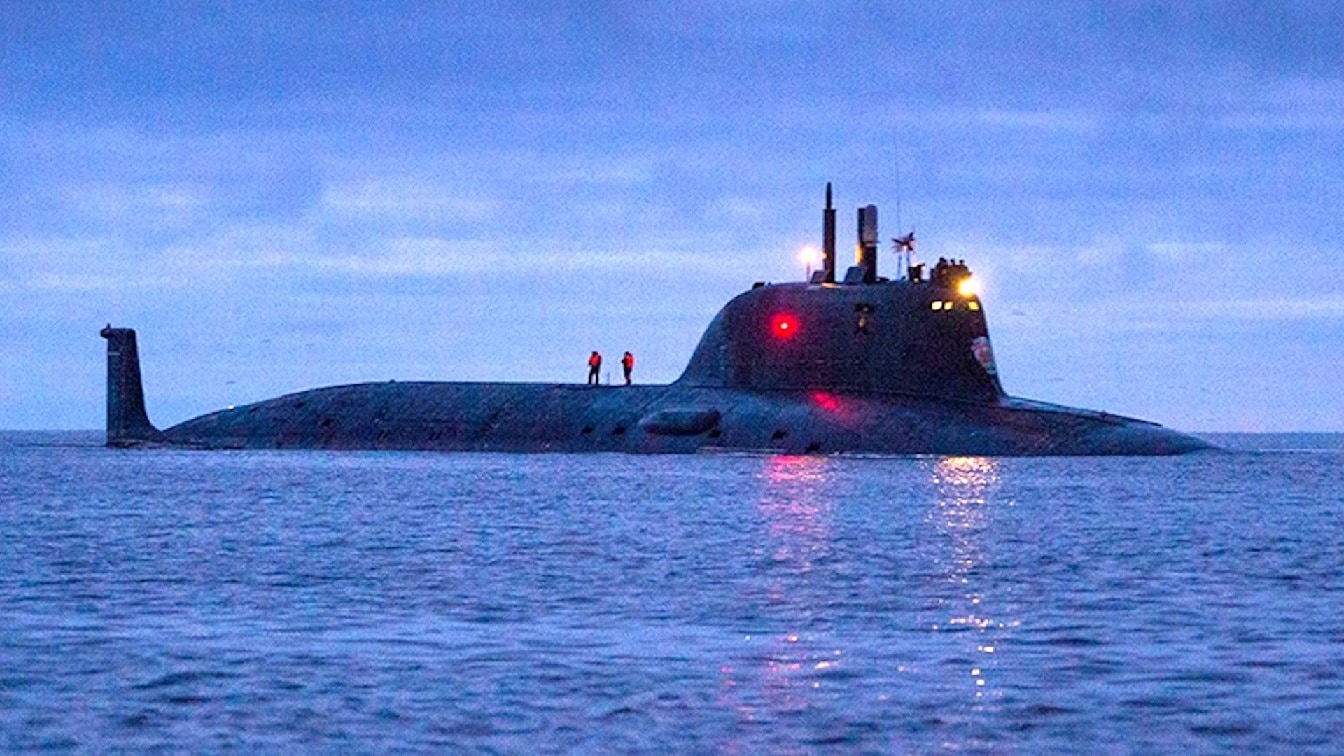What the Ukraine Crisis Doesn’t Need: A Russian Navy Submarine Colliding With a British Warship: Bad enough that a Russian submarine recently collided with a British warship — for the first time since the end of the Cold War.
But with tensions already running high between Russia and the UK over a potential Russian invasion of Ukraine, an incident between British and Russian warships is the last thing the world needs.
Fortunately, the incident was before tensions with Ukraine started to build, and as maritime mishaps go, the collision was fairly minor.
A Russian Submarine and Royal Navy Warship Collide
The frigate HMS Northumberland, tracking a Russian sub in the North Atlantic north of Scotland, had lowered its towed sonar array. Consisting of hydrophones attached to a cable – up to several miles long — that is trailed behind the ship, the array listens for sounds made by submarines while keeping the microphones some distance behind the towing ship’s noisy propellers.
But at some point in late 2020 – the Royal Navy has not specified the exact date, though apparently, it was in December – the sonar array collided with something that was presumably the Russian sub. The sonar “was damaged to such an extent that the warship had to return to port in order for the sonar to be replaced,” according to Britain’s Daily Telegraph.
Ironically, a British television crew was on board the Northumberland when the accident happened. While the documentary has yet to screen, a clip of the broadcast shows the reaction of the crew – complete with bleeped-out obscenities – when they realized the ship had been hit.
A Royal Navy source told the Telegraph that the noise of the collision would have been so loud to the submarine’s crew that “they probably would have scared themselves shitless when they did it.”
There is no reason to believe the collision was deliberate. It certainly would not be in the interest of a submerged submarine to collide with anything. Nor was it necessarily carelessness. It’s quite possible, for example, that one of the vessels made an unexpected turn. The ocean is a big enough place that the probability of a sub hitting the array was “infinitely tiny,” the Royal Navy official told the Telegraph.
Collisions with Russian Submarines Happen
This isn’t the first time that Russian and Western warships have collided, especially during the Cold War when Soviet vessels shadowed U.S. aircraft carriers and submarines in sometimes risky cat-and-mouse games.
For example, in 1984, the carrier USS Kitty Hawk collided with a Soviet sub in the Sea of Japan. Not that Western navies don’t have their share of accidents: in 1969, the Australian carrier HMAS Melbourne sliced the American destroyer USS Evans in half during an exercise in the South China Sea.
Nonetheless, with tensions and tempers running hot over 100,000 Russian troops massed on Ukraine’s border, any new collision between Russian and Western ships – especially if there was severe damage or loss of life – could ignite an already dangerous situation.
Compounding the problem is that Russian sub-activity in the North Atlantic has grown to the point where U.S. Navy commanders have warned that the North Atlantic should be considered a contested battlespace. For example, Russian subs have been spotted near underwater telecommunications cables whose loss would disrupt U.S. and British communications, including Internet traffic.
Where there are subs present, there will inevitably be sub-hunters, including surface ships and other submarines searching for their underwater prey. This will inevitably raise the risk of collision – and the political fallout from these accidents.
A seasoned defense and national security writer and expert, Michael Peck is a contributing writer for Forbes Magazine. His work has appeared in Foreign Policy Magazine, Defense News, The National Interest, and other publications. He can be found on Twitter and Linkedin.

